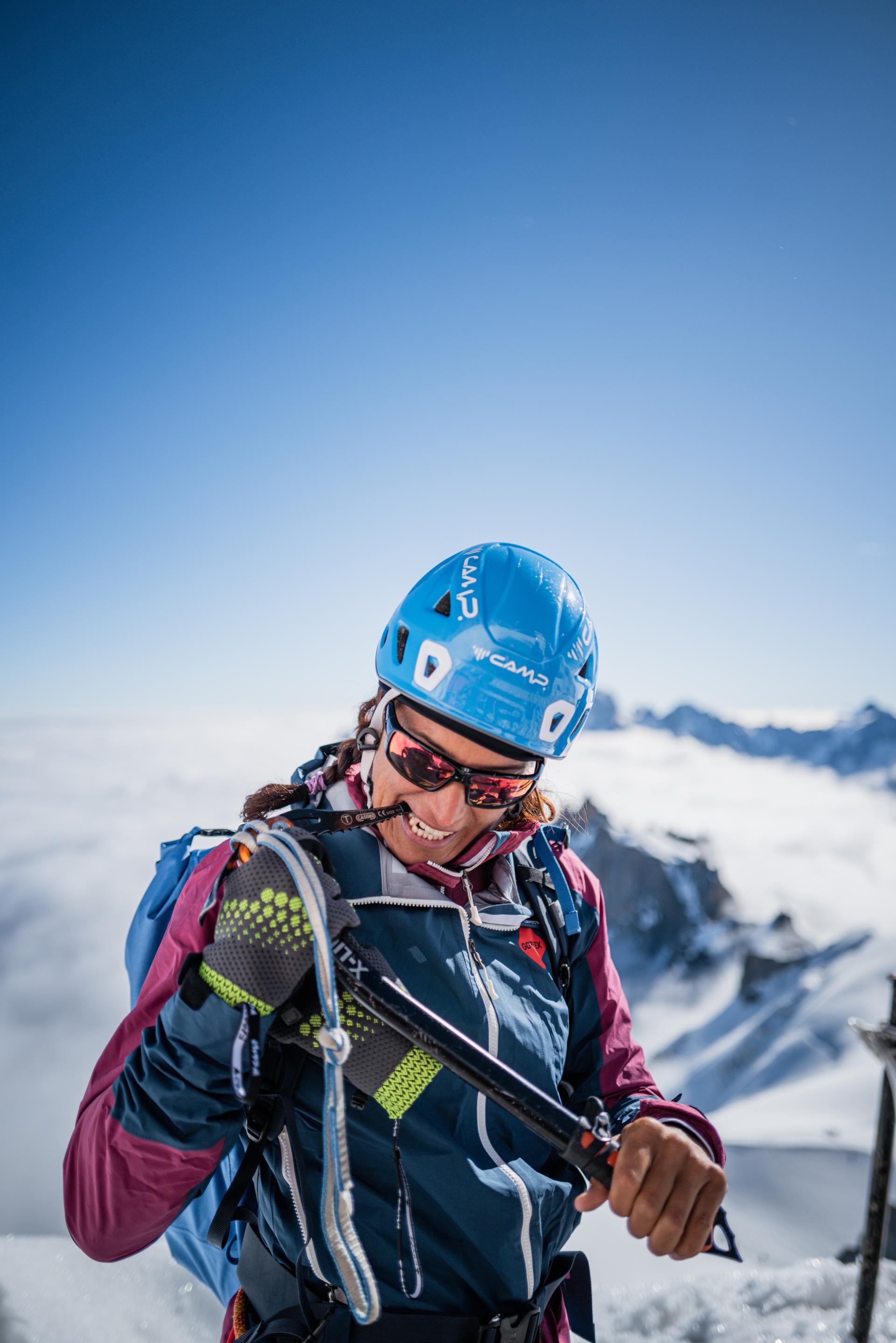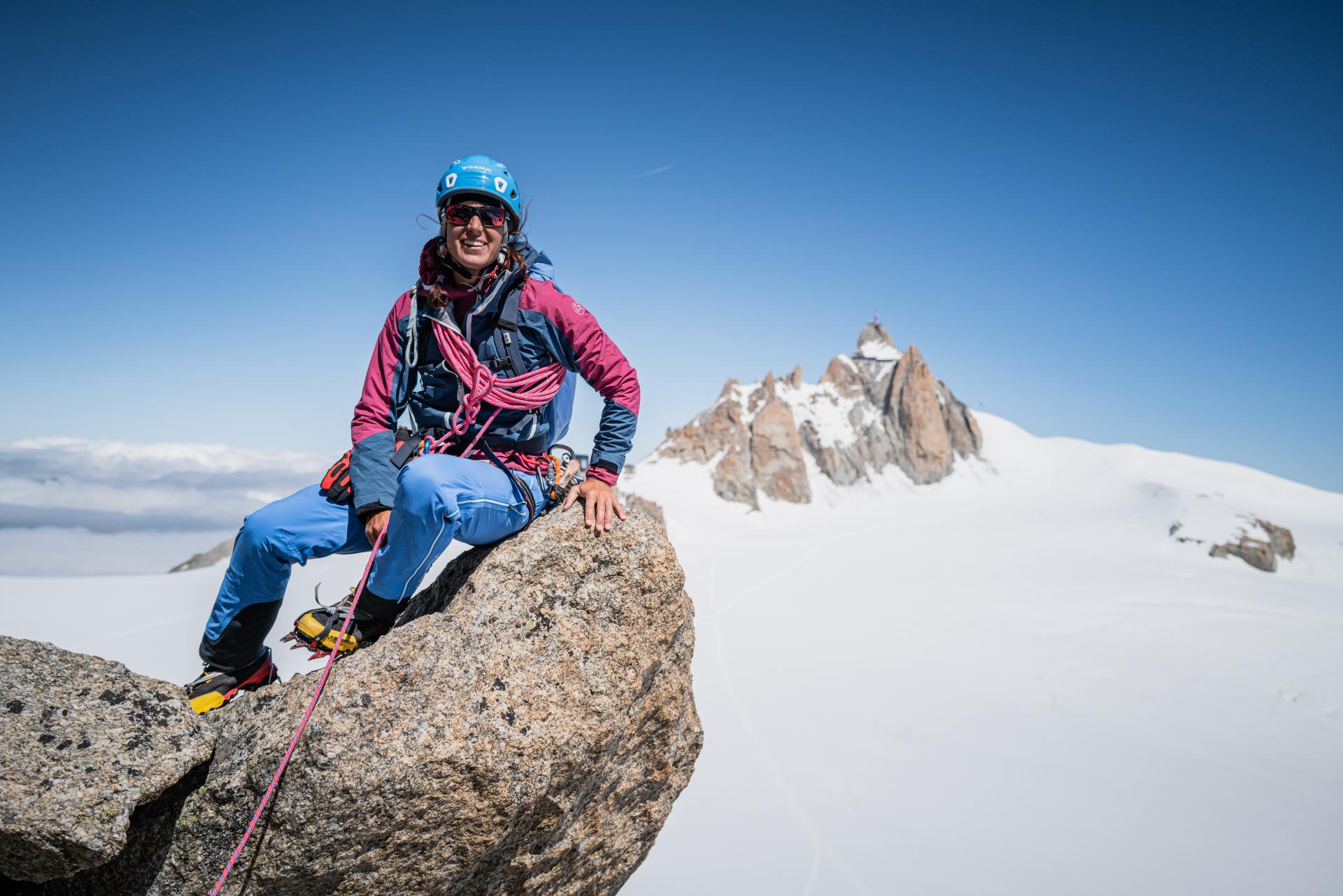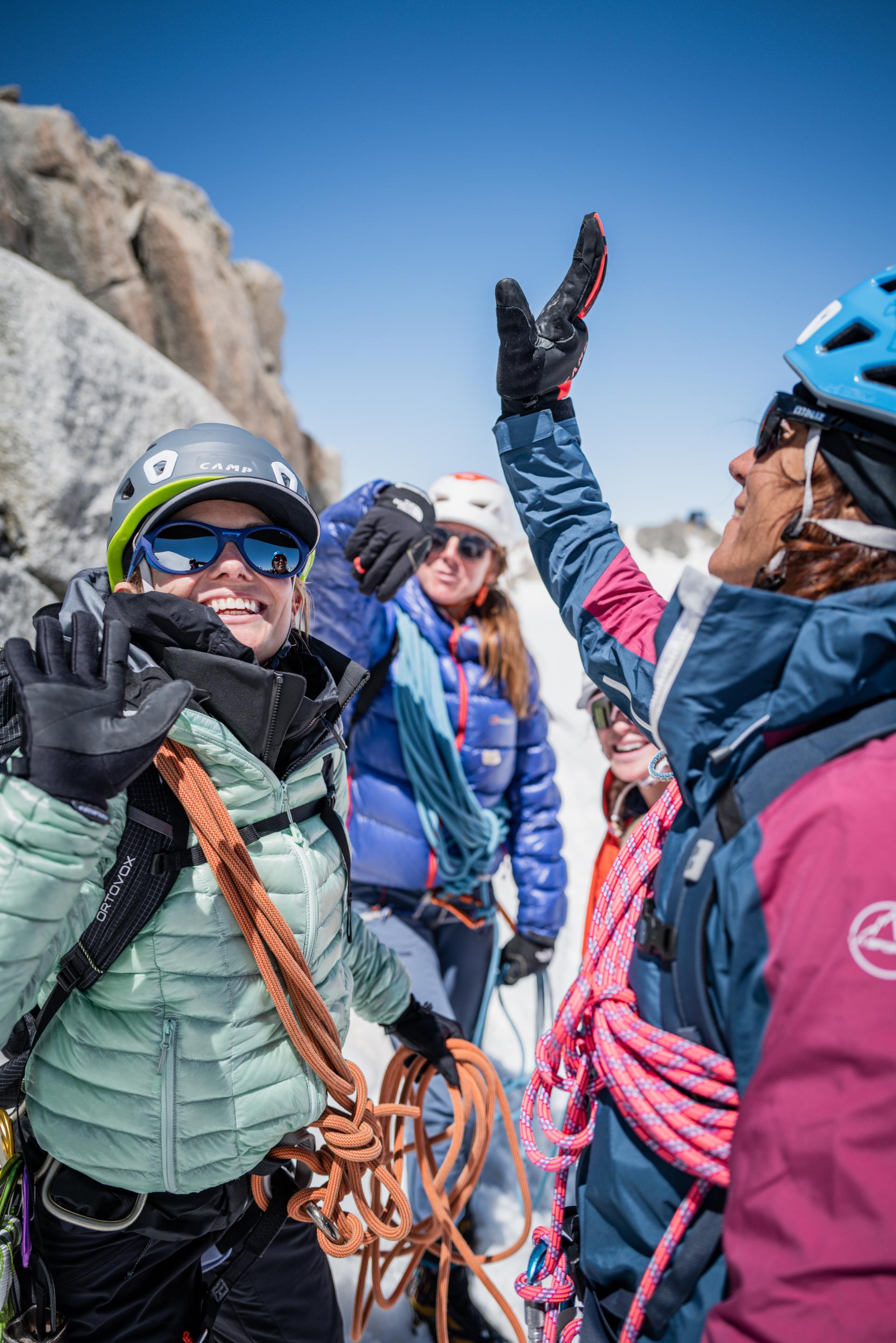PART TWO - LEARNING TO LISTEN
Tamara Lunger is a famous Italian mountaineer. She was a national ski mountaineering champion and the youngest woman to summit Lhotse (8,516 meters). In part one of this in-depth interview we discussed her transition from ski mountaineer racing to climbing in the Himalayas and her special rope partnership with Simone Moro.
In this second part, Tamara opens up about experiencing loss and trauma in the mountains and the impact that has had on her.
 Tamara playing around above Chamonix (Photo by Philipp Reiter)
Tamara playing around above Chamonix (Photo by Philipp Reiter)
In all these expeditions, did you have any close calls aside from Manaslu?
In 2016 on Nanga Parbat (the ninth-highest mountain at 8,126 meters in Pakistan), we wanted to be the first team to summit in winter. I wanted it badly. But on the summit morning when I stepped out of the tent I felt not the best, I knew it wasn’t my day. I had heavy muscles, but I knew I had to dig. I thought back to my racing days and gave everything I had. Just seventy meters below the summit, I needed to turn around because a voice told me:” If you continue to the top, you won’t make it home.”
This feeling was so clear and intense that I didn't question it, I knew what to do, I needed to go down. As I was heading down, I had a fall and I thought “It’s game over!” At that moment I felt like I had already died. I was not afraid of dying, but I was afraid that the process might hurt a lot. There were 3000 meters of ice and rocks and snow below me that would cut me to pieces.
You were having these thoughts as you were falling?
Yes, but then some soft snow stopped me. It was sunset and I was sitting there, I think my heart rate was 250, I thought: “Okay, this is now my second life.” I still needed to make it back to the tent, which I did.
I didn't make my big dream of being the first woman to summit in winter come true, but the others on the team, Simone Moro, Alex Txikon and Ali Sadpara, did. This was my first big meeting with my intuition. Until then, the idea of intuition felt like ‘woman bullshit’ and I wouldn’t listen. I always thought that it was taking me away from being powerful. Instead, I chose to push myself harder. I was at war against my own body. I would say to it “If you’re hurting, I will give you more. I will push harder!”
Were you trying to prove something?
Yes. I wanted to have one hundred percent control over my body. I was a slave of my brain which said, “My body is too weak”. I wanted to prove myself every day. It was very hard to always feel like that. I envied ‘normal people’ without this drive. I wondered how they could seem so content in their day to day lives. Part of me wanted that.
Many people told me “You cannot push your body like this”, but I wouldn’t listen. Even though I studied sport science and knew the theories, I thought they didn’t apply to me.
You’re a religious person, did you feel that the intuition on Nanga Parbat was God? Or was it a voice from within you?
It was a connection to God, to nature. I think it's a connection to this big energy of the universe that we are all part of. It was the first time that I was conscious of this voice and the information I got from this big energy. It was quite amazing to me because I knew that it saved my life. I was one hundred percent sure that if I had not listened to it, I would be dead.
You didn't reach your one big goal, but you did reach a powerful other goal in that moment, almost like a big gift for the rest of your life. When you come down from that kind of experience are you able to bring that with you off the mountain?
This was a very hard time for me because when I went home it was a big story. It seemed like my “failure” made it even more romantic. The news made it sound like I somehow sacrificed myself for the other’s success. I was so angry about this, because at 8,000-meters in winter you are largely responsible for your own survival.
Essentially you are soloing together.
The person I felt closest to up there was God. I was speaking with him constantly, like he was next to me. Even though the other guys were 20-meters away from me I felt a loneliness I had never felt before. I knew that if I were to break my leg nobody could help me, and I would not expect them to, and I knew that they felt the same. I needed to be responsible for my own life.
I was craving a life at the limit, and I found it up there. I never wanted flat water. I wanted waves, big waves. I was always trying to push, “This is going too well, let’s suffer a bit”, you know?
Did that experience make you push more?
In the winter of 2020 Simone asked me to go to Gasherbrum (the 11th highest mountain at 8,080-metres in Pakistan) and the glacier was very complicated. It took us eighteen days to gain 500 meters of elevation. On the eighteenth day Simone fell into a crevasse. I had no time to react. We had snowshoes on, and I couldn’t get to my ice axe. I went flying like superwoman. I prayed to God again “Please stop me!” I stopped with my hand by the edge. It was so painful! He was hanging there below me. I was holding his 90-kilos by my fingers. I was screaming “Simone, cut the rope if you're safe”, because it was so painful, but he couldn’t hear me. I kept screaming as I held him. After maybe five minutes, he put in an ice screw and could unweight the rope and I was finally able to remove my fingers from the system, but my hand was useless, so I had to do everything with my mouth and one hand. I was also afraid of crevasses, so I couldn’t move too much. Eventually we got him out, and luckily, he was mostly okay.
That must have been very scary for you.
I was left with many questions after another close call. I wondered what would happen a third time. The next winter I was invited to Manaslu (the eighth-highest mountain at 8,163 metres in Nepal), but I said no. I felt a bigger call to return to K2, this time in winter, so I started preparing mentally.
 Tamara above the Vallee Blanche in Chamonix (Photo by Philipp Reiter)
Tamara above the Vallee Blanche in Chamonix (Photo by Philipp Reiter)
What does that mean for you? Were you working with a sports psychologist? Were you meditating? Praying?
At that time, I did not get therapy, I have now started trauma therapy, but not then. I was meditating and training, trying to become mentally and physically strong for a hard expedition. The partner I had wanted to go to the mountain with did not work out, so I had to change plans.
The trip was hard from the start. We watched Sergi Mingote die in our hands. After much heartbreak and soul searching, I went on with Sergi’s partner, JP Mohr from Chile. It was so important that we had each other because it was so intense. We were able to cry and grieve together. We said that Sergi would look after us. He will send us energy and power, so we went up, but I had terrible stomach problems and could barely eat. I knew I was not at one hundred percent. I said “Okay, we will try, but I need to listen to my intuition. Day by day I need to decide.” We went up, but after three days I knew it wasn’t my turn.
You went through a big trauma. Do you think your body was reacting to the experience?
Yes, my body was for sure reacting. When Simone fell in the crevasse and then again when Sergi died, I started to have my period, even though I had already had it two weeks before. I understood then how involved the whole being is in these emotional events.
The body really responds to traumatic experiences.
I tried everything to regain my strength, meditation, and some rest, but once again my intuition told me the time is not right. I thought; “Maybe all these problems are actually here to help me.”
Even going down was dangerous. We had another accident, one guy fell 1,600 meters and then when I was back in base camp, we did not hear from the three men still on the mountain, it was incredibly stressful. The waiting was agonizing. Eventually, I knew that they weren’t coming back. Something inside me broke. I stopped being able to feel my body, I was crying uncontrollably. It was awful.
That’s a lot of loss and hard experiences in a short period.
Yes. Sergi, JP, and I had become close. We were on the same page. They were always smiling, always happy, always fun. We spoke about future trips, it was magic. And then they died!
I was asking myself a lot of questions. “Why do I have this record?” “Why am I here?” “Why do positive things always turn negative?” It was the hardest period of my life.
These two years were the hardest of my life. I was very sad, crying, crying, crying, I gained 10 kilos. I didn't want to go to the mountains anymore. I didn’t want to feel cold, or fatigue. No more! I didn't want to speak to anyone. I wanted to be left alone.
I am so sorry you experienced that. I know what that is like. My wife died in an avalanche when I was skiing with her, so I know about your feelings. I know what it's like to not be able to talk to people about it and to hold that because other people don't understand the experience that you've gone through. I have a lot of empathy for the position that you've come from. It's heavy. It's very heavy. Its really hard and lonely. I also know about trauma therapy.
I am so sorry!!! Yes, the therapy helped me a lot.
It's very powerful for sure, but you must be ready and willing to accept it.
Yes, you need to wait a certain amount of time because at the beginning I was just crying all the time.
I agree, at the beginning you're too raw, too broken.
Yeah. Every song, every little thing reminds you of a moment and you start crying.
Yes, and then you're embarrassed because you're crying all the time and you think everyone is looking at you.
Luckily, I had very good connections with their relatives. Sergis’ wife wanted to be close to me. I was the last person to hold him, so she held on to him through me.
That must have been hard too.
Yeah, it was hard in a way, but after a period something switched in her, and I felt her getting better and better. One day she said to me “Tamara, Sergi was taken from my life. But God, or the energy, gave me you." These words were the greatest I have heard in my life. I was very grateful.
 Tamara celebrating with clinic participants at the Arc’teryx Alpine Academy (Photo by Philipp Reiter)
Tamara celebrating with clinic participants at the Arc’teryx Alpine Academy (Photo by Philipp Reiter)
The time with Sergi’s wife was therapeutic for you too then?
Yes. Somehow in all this, I found an answer to the questions I was asking myself. I realized that I rarely listened to my own needs. I had some near-death experiences and I didn't stop. I kept pushing forward.
I think I needed this big intensity of pain to get me to pause. I started again from below zero and I rebuilt slowly, but it was so hard because I questioned my whole identity. “Was this really me, or did I just want to prove myself? Am I really a mountaineer? Do I really love mountains?” Everything was in doubt.
And then, after a year people forget. They started asking me “Where’s the next expedition?” And I thought “Why do we need to be like machines? Why is there no time to grieve?”, but I also wanted to be the person they wanted me to be, so I started to train again, but after two weeks I had so much pain in my back that I couldn’t even wash my face. I knew that this was happening because I wasn’t listening to myself, so I stopped. I did some physiotherapy but I didn't do any more sports. Secretly I was happy because I had an excuse to stop!
After half a year I started again. I knew I needed to start slowly to not become what I was before. Then, two weeks in, I twisted my ankle and tore two ligaments. After a bit I started again, and I hurt myself again. I thought “You’re such an idiot, you’re not ready yet.” Over time I changed my approach. I looked at more aspects of myself. I started trauma therapy and examined my motives. I explored this apparent need to perform. I'm still in the middle of this self-examination.
What have you discovered so far?
I, and people around me, had created an image of Tamara, who is this performing athlete, this hard and tough woman and I wanted to be that woman. At the same time, I understood that I never gave real value to myself as a person, only to me as an athlete.
This discovery was painful to me. I thought I needed to bury the old person, to rebuild myself. Before I wanted to be a performer, but I felt that change. I no longer wanted to be defined by my achievements. I needed to love myself. To love my body. I needed to do more meditation, more stretching, more core training, and I needed to look after myself more, but it’s not easy to change.
I also did an archetype assessment which really helped me understand myself. I was told by an assessor, “I'll give you one more year to live if you are not able to assert your feminine energy.” This was a very powerful process, but it is hard to accept this new me, because I also thought, “Okay, I'm a sponsored athlete, maybe they have expectations of me, what should I do? How should I behave?” I feel the weight of these expectations. I’m in the process of understanding how to manage it.
Do you want to know what happens next? Then read the third part of the article now!





